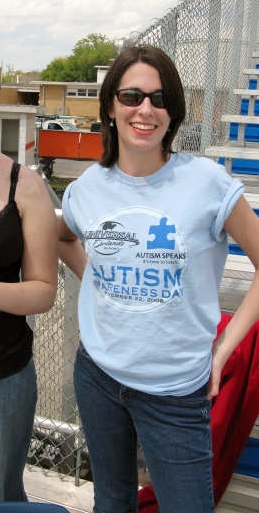And it's not always an issue of using the logo without knowing how hurtful it is. A lot of autism organizations are aware of that people have reported it hurtful, and yet they still use that logo, and that bothers me most of all. Caley once went to a large autism organization seeking aid, only to find that their informational table was plastered with puzzle pieces. She said that as an Autistic person, she found the puzzle piece logo to be hurtful. She said, "I'm a person, not a puzzle." And they replied, "Oh, we know a lot of autistic people find it hurtful, but we have to use it."
Caley was SO upset to hear that this organization that purportedly stood for autistic people used a logo that they themselves KNEW many autistic people found hurtful that she had to walk away. That day, and to this day, she did not get the help that she needed from the organization, because they had hurt her.
Yes, I realize you can't change your logo just because one person doesn't like it, but this isn't one person, this is scores upon scores of people who actively find it hurtful. And yet, it's still used. And that fact? That fact really, REALLY upsets me.
So if you're trying to help autistic people, please, PLEASE use another symbol. The infinity spectrum is the commonly accepted alternative, if you're looking for one. But don't use, or if you can avoid it, even share anything with a puzzle piece. I can tell you Caley cringes every time she sees one, turning an attempt to help into something very hurtful, and you know what? She's not alone. So if you're looking to help autistic people, use a different symbol. And when an autistic person tells you something is hurtful, please, PLEASE listen.
-Creigh
Further Reading:
Judy Endow's Post Goodnight Autism Puzzle Pieces
http://ollibean.com/2014/04/04/goodnight-autism-puzzle-pieces/
A beautiful picture of Autistic advocates protesting...well, a lot of things, but puzzle piece logos among them
http://2.bp.blogspot.com/_VyorhzF_el4/S89bae-bUKI/AAAAAAAAAH4/Y2hzkNFMpj0/s1600/group1.jpg
I'm a Person, Not a Puzzle (shows the alternative the autistic community has offered to the puzzle piece, the infinity spectrum)
http://chaoticidealism.livejournal.com/32509.html
Also, those of you who also liked his page may note that this post heavily drew from a comment I left on Invisible Strings's post about his own feelings on the puzzle piece logo. Awesome page, if you haven't liked it yet, I highly recommend doing so!

 RSS Feed
RSS Feed
